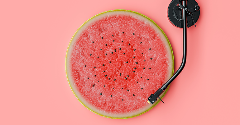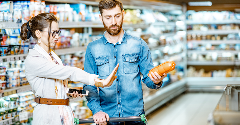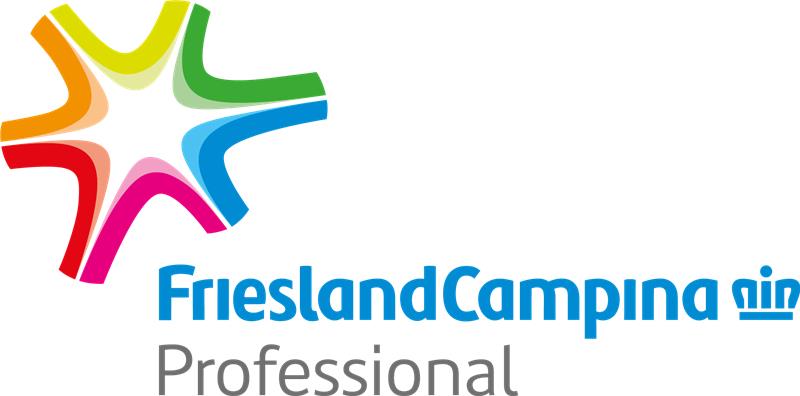News
FrieslandCampina sees profits fall 32.7% for 1H18
4 Sep 2018Royal FrieslandCampina revenues amounted to €5,721 million over the first half-year of 2018, 5.8% down. Profit decreased by 32.7% to €109 million, primarily due to losses on cheese, butter and milk powder basic dairy sales.

Royal FrieslandCampina revenues amounted to €5,721 million over the first half-year of 2018. This is 5.8% lower in comparison to the first half-year of 2017, of which 5.0% is due to currency effects and the sale of Riedel. Profit decreased by 32.7% to €109 million, primarily due to losses on cheese, butter and milk powder basic dairy sales. Inventories of these basic dairy products, which were produced in previous months at higher milk prices, had to be sold at a loss. The negative trend in the added value volumes has not yet reversed itself. This underlines the importance of the transformation process initiated last year, the company said. Results of the sale of consumer products and ingredients, adjusted for currency effects, were stable. The pro forma milk price for member dairy farmers decreased by 4.2% to €36.74 per 100 kilos of milk. The interim payment for member dairy farmers amounts to €0.41 per 100 kilos of milk.
Hein Schumacher, CEO Royal FrieslandCampina, said: “In the first quarter of 2018, similar to the last quarter of 2017, FrieslandCampina faced low prices for basic dairy products, which insufficiently compensated the guaranteed price of milk paid by the Company to member dairy farmers. This puts pressure on the Company’s results. There was a recovery in the second quarter. Strong price competition for infant nutrition in Asia is challenging us to fight for our market position. This requires additional investments and a nimble organisation. In part for this reason, the organisation structure was adjusted effective on 1 January 2018 and an intensive transformation programme is underway. This enables us to operate faster in the market and to structurally lower costs.”As part of the transformation programme, FrieslandCampina notes that non-profitable activities are being reviewed. For example, the supply chain network was reviewed and an announcement was made to close down two production facilities in France. The costs involved in these closures were recognised in the first half-year. Together with other restructuring initiatives, €30 million in transformation and restructuring costs were recognised.Operating profit in the first half of 2018 amounted to €177 million, 35.6% lower compared to the first six months of 2017. Currency effects had a negative effect of €21 million on the operating profit. Without currency effects, the operating profit was 28.0% lower than in 2017.In the first quarter of 2018, similar to the last quarter of 2017, the loss on basic dairy was substantial to the amount of approximately €135 million. In addition, severe price competition in Asia for the infant nutrition market had an adverse effect on operating profit. The trend in the second quarter results is positive, the company said, but insufficient to offset the backlog created compared to the first half of 2017. The results of the Consumer Dairy and Ingredients business groups, adjusted for currency effects, are showing a stable trend. Furthermore, the abovementioned transformation and restructuring costs are impacting the result.In comparison to the first six months of the previous year, the milk supplied by member dairy farmers decreased in the first half-year 2018 by 79.5 million kilos (1.5%) to 5,356 million kilos of milk. To ensure that phosphate production in the Netherlands remains below the phosphate ceiling, the system of phosphate rights for dairy livestock went into effect on 1 January 2018. As a result of this measure, the number of dairy cattle held by member dairy farmers in the Netherlands has decreased and as a consequence also the milk supply.The pro forma milk price for the member dairy farmers over the first half-year of 2018 decreased by 4.2% to €36.74 per 100 kilos of milk exclusive of VAT (first half-year 2017: €38.37). The milk price that FrieslandCampina pays member dairy farmers on an annual basis consists of the guaranteed price, the annual performance premium, the meadow milk premium, the special supplements premium and the issue of member bonds.On 1 September 2018 at the latest, FrieslandCampina will distribute an interim payment in the amount of €0.41 per 100 kilos of milk (exclusive of VAT) to the member dairy farmers of Zuivelcoöperatie FrieslandCampina. This payment is €0.76 lower than in the first half-year of 2017. The interim payment represents 75% of the pro forma performance premium over the first half year.Friesland Campina said that the expectation is that in the second half of 2018, global milk production will once again increase due to the relatively high milk prices. The long-term drought in Northern Europe has a negative effect on feed production. This may put the growth of milk supply somewhat under pressure in the fourth quarter. The demand for dairy on the global market will probably remain high, thanks to strong economic growth in countries that import dairy products, such as China, and countries in Southeast Asia and the Middle East. The high oil prices throughout the world show that there is economic growth. On this basis, it is safe to assume that the demand for dairy products will continue to increase.Negative weather conditions, political developments in the European Union and potential problems in international world trade, such as creating trade barriers or higher import duties in key importing countries, could put milk prices under pressure.Related news

Retail landscape lacks nutritious and affordable food, says ATNi
30 Dec 2025
A rapid increase in modern food retail has given retailers growing influence over consumer diets, according to global non-profit ATNi’s latest assessment.
Read more
Debate over ban on ‘meaty’ names for plant-based products reaches stalemate
26 Dec 2025
The debate over a ban on plant-based products using “meaty” terms has reached a stalemate, leaving manufacturers in limbo and still facing overhauls to their marketing and packaging.
Read more
Multi-sensory food and drink products to gain traction in 2026
16 Dec 2025
Trend forecasters predict that sensory elements will play a larger role, helping food and beverage brands differentiate themselves in a competitive market in 2026.
Read more
Big appetite for M&A between European and US food and drink companies
3 Dec 2025
Persistent tariffs on EU food and beverage exports have helped drive record levels of M&A activity between European and US companies this year, according to analysis by ING.
Read more
Non-UPF Program extends certification scheme to entire food industry
30 Nov 2025
The Non-UPF Program has extended its certification scheme to the wider food sector, championing a move towards healthier consumption habits.
Read more
Lancet study links UPFs to chronic disease risk
26 Nov 2025
UPFs are consistently associated with an increased risk of diet-related chronic diseases, according to a comprehensive review of global evidence in The Lancet .
Read more
Concerns swirl around cinnamon’s compliance with EU law
25 Nov 2025
Cinnamon may be a top functional ingredient, but it needs stronger protocols to ensure it meets EU food safety laws and quality standards, say researchers.
Read more
Oat Barista: Innovation for game-changing beverages
20 Nov 2025
Oat Barista is a clean label, sustainable, and innovative drink base specifically designed to create the perfect foam in one single ingredient.
Read more
How younger consumers are redefining ingredient choices and rejecting brand loyalty
18 Nov 2025
Gen Z and millennial consumers’ preferences for transparency, functionality, and purpose are “redefining the very nature of consumption itself”, says SPINS.
Read more
Hybrid formats and flexible positioning to disrupt category norms in 2026
17 Nov 2025
Trend forecasters expect food and drink to move more fluidly across occasions, functions, and formats as consumers seek versatility, novelty, and convenience.
Read more
